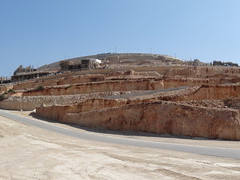- Facebook24
- Total 24
In yesterday’s New York Times, Isabel Kirshner reports from Rawabi, the planned city that’s rising on a hill between Jerusalem and Nablus. She describes Rawabi’s struggles with the Israelis over permits and water, limited support from the Palestinian Authority, and criticism from the “Palestinian Boycott, Divestment and Sanctions National Committee, which opposes any normal ties with Israel. The committee has accused Mr. [Bashar] Masri [Rawabi’s developer] of promoting his private interests at the expense of Palestinian rights and of whitewashing the Israeli occupation.”

I am not sure what to conclude about the politics. But I have been to Rawabi, where I received the official promotional tour, designed mainly for prospective investors and residents. One of my colleagues took this snapshot as we approached.
Rawabi is an impressive place from the perspective of planning and development. It is environmentally friendly, aligned with the new urbanism, and yet–at least to my naive eyes–also consistent with the traditions of the region. Terraces of stone houses will line the hill, creating streets and squares for pedestrian traffic and shopping. Many residents are likely to commute, and their cars will be accommodated in underground garages. Ample attention is being paid to common or public amenities, including the central mosque and a church.
The politics are complicated because this is a Palestinian project that does not challenge the Israeli occupation. Indeed, I think Rawabi is good for Israel, creating a nice new Palestinian town on land that Israel does not officially contest, and thus potentially relieving pressure on the Jerusalem area. The kind of state that it invokes–orderly, prosperous, high-tech–would be easy for Israelis to live next to. Rawabi also brings business to Israel, which provides the town’s only port and airport and supplies many of its materials.
The fact that Rawabi is good for Israel does not make it bad for Palestinian aspirations. I am confident that the motivations for building it are nationalistic. It is about creating autonomy and prosperity within the Palestinian territory. Bashar Masri is an international businessperson who could make more money in other countries, including the US, where he lived for 25 years. He sees himself as investing in the Palestinian nation.
But this a classic situation in which choosing a win/win strategy could possibly undermine your side’s bargaining position in the inevitable zero-sum struggle for finite resources (land and water). That is essentially what the Palestinian Boycott, Divestment and Sanctions National Committee seems to be saying–and I am not surprised by their view.
Meanwhile, the Israelis show only grudging tolerance for Rawabi. When we were there, the developers were struggling to get permits for an access road. Apparently, not all Israelis see this development as good for their side. I do not know whether that is because they hold a purely zero-sum view of the geopolitical conflict (anything good for the Palestinians must be bad for Israel), because some influential Israelis actually want the land on which Rawabi is built, or because red tape is just pervasive. In any event, the obstacles seem foolish to me.
Again, I do not know enough to make an overall judgment of Rawabi from a Palestinian perspective. But I have a bias in its favor, based on the general premise that building things confers power. I am fully aware of the radical disparities in the situation. The Israelis possess the main cities, all the ports, the contiguous population centers, access to water–and jets, tanks, and the bomb. The Palestinians do not. I would favor substantial changes in that balance. But the question is how to get a just outcome while also developing Palestinian nationhood.
On the same day that we visited Rawabi, we had met with representatives of the Palestinian Authority, who emphasized the many ways in which they were being victimized by Israel and misunderstood by Americans. I did not disagree with their position, but it was hard to be impressed or to see a path to success. It was very easy to be impressed by Bashar Masri in Rawabi. Maybe he is impressive because he is an international businessperson, hence a representative of the ascendent “neoliberal” order, whereas the Palestinian Authority is a Third World bureaucracy running on borrowed cash. In that case, ideologically, I should be more sympathetic to the PA than to Masri. But another interpretation is that Masri is creating a reality while the PA is asking for something akin to pity. Also, Masri has a strategy (offering a win/win opportunity for his side and the side that has the tanks), whereas I couldn’t detect a strategy in the PA office in Ramallah. Rawabi represents productive, constructive power that can only help the Palestinian cause.